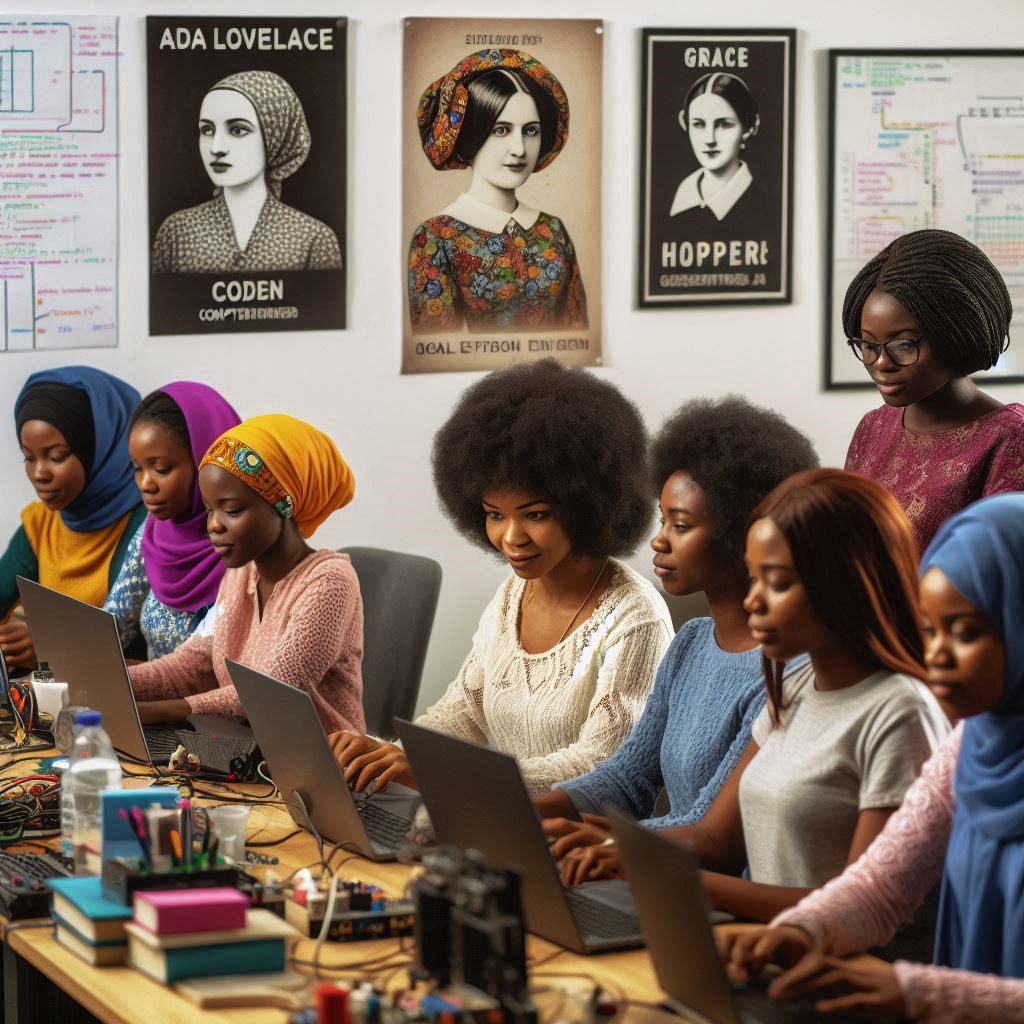Introduction
Women in computer engineering in Nigeria face unique challenges and opportunities.
They have historically been underrepresented in this field.
Gender biases and societal expectations often hinder their progress.
Despite these challenges, many Nigerian women have excelled in computer engineering.
They actively contribute to technological advancements and innovation.
Educational institutions are now offering more STEM programs for women.
These initiatives aim to bridge the gender gap in technology fields.
Women in computer engineering benefit from networking opportunities and mentorship programs.
These support systems are essential for career development and overcoming obstacles.
Many successful female engineers serve as role models and advocates.
They inspire the next generation of women to pursue careers in tech.
The Nigerian government and private sector are promoting gender equality in STEM.
They provide scholarships, training, and career opportunities for women.
With continued support, Nigerian women in computer engineering will thrive.
Their contributions will significantly impact Nigeria’s technological and economic development.
Historical Perspective
The History of Women’s Involvement in Computer Engineering in Nigeria
Women in computer engineering in Nigeria have made significant strides despite numerous challenges.
Their journey began in the late 20th century when the field of computer engineering started gaining traction in Nigeria.
Women faced societal expectations and gender biases but persevered to establish a presence in this male-dominated field.
In the 1980s, few Nigerian women ventured into computer engineering.
Yet, they made substantial contributions despite limited resources and opportunities.
These pioneers broke barriers and inspired future generations.
Their determination set the stage for increased female participation in the technology sector.
Key Milestones or Achievements of Women in This Field
One notable milestone was the establishment of the Nigerian Women in Information Technology (NIWIIT) in 2003.
NIWIIT aimed to empower women in IT through networking, mentorship, and advocacy.
This organization provided a platform for women to connect, share experiences, and support each other’s professional growth.
In the 1990s, women began to make their mark in academia.
Dr.(Mrs.) Adeola Oduwole became one of the first Nigerian women to earn a Ph.D.in Computer Science.
Her achievement inspired many young women to pursue higher education in computer engineering and related fields.
Dr. Oduwole’s work emphasized the importance of female representation in academia and research.
The turn of the century saw more women entering the tech industry.
Female engineers started to hold prominent positions in various organizations.
One such pioneer was Funke Opeke, who founded MainOne, a leading provider of innovative telecom services and network solutions in West Africa.
Her work revolutionized internet connectivity in Nigeria and showcased the potential of women leaders in tech.
In 2015, the Nigerian Society of Engineers (NSE) appointed its first female president, Engineer Joanna Olu Maduka.
Her leadership highlighted the evolving role of women in engineering and inspired many young girls to pursue careers in STEM.
Engineer Maduka’s tenure focused on promoting gender equality and supporting female engineers.
Nigerian universities also played a crucial role in encouraging women’s participation in computer engineering.
Institutions like the University of Lagos and Obafemi Awolowo University introduced programs and scholarships specifically for female engineering students.
These initiatives aimed to reduce the gender gap and provide equal opportunities for women in tech education.
The rise of tech hubs and incubators in Nigeria further accelerated the involvement of women in computer engineering.
Read: Community Mapping Projects in Nigeria
Current Trends
The Current Representation of Women in Computer Engineering in Nigeria
Women in Nigeria have increasingly embraced computer engineering in recent years.
Universities and technical institutes report a steady rise in female enrollment.
Companies now actively seek gender diversity, aiming to balance their tech teams.
Initiatives and organizations support women in tech, fostering a more inclusive environment.
Women occupy various roles in computer engineering, from software development to cybersecurity.
They contribute significantly to innovation and problem-solving within the industry.
Nigerian tech events frequently highlight the achievements of women, showcasing their expertise and leadership.
Despite progress, challenges persist.
Cultural norms and gender biases still hinder the full participation of women in computer engineering.
Many women face obstacles in career advancement due to systemic inequalities.
However, the tech community continues to address these issues through advocacy and policy changes.
Analyze Relevant Statistics and Data on Gender Diversity in the Field
Statistics reveal a positive trend in gender diversity within Nigerian computer engineering.
According to a 2022 report, women constitute about 30% of the tech workforce.
This figure marks a significant increase from previous decades, reflecting efforts to promote gender equality.
University enrollment data supports this trend.
Female students make up nearly 40% of computer science and engineering courses in major universities.
Scholarships and mentorship programs specifically targeting women have contributed to this rise.
These initiatives help bridge the gender gap and encourage more women to enter the field.
However, the disparity remains evident in leadership roles.
Women hold only 15% of senior positions in tech companies.
This statistic underscores the need for continued efforts to support women’s career growth.
Mentorship programs and leadership training aim to address this imbalance, providing women with the tools to succeed.
The pay gap between men and women in tech also persists. On average, women earn 20% less than their male counterparts.
Organizations are increasingly aware of this issue and are working towards equitable pay structures.
Transparent salary policies and advocacy for equal pay remain crucial.
Survey data indicates that women in computer engineering experience higher job satisfaction than in previous years.
Many women report feeling valued and supported within their organizations.
Companies with inclusive cultures and supportive policies see higher retention rates among female employees.
Nigerian tech hubs and startups play a vital role in promoting gender diversity.
Many startups boast higher female representation compared to established companies.
These environments often provide flexible work arrangements and emphasize work-life balance, appealing to women in tech.
Government policies also impact gender diversity in computer engineering.
The Nigerian government has launched initiatives to promote STEM education among girls.
Read: Overview of Polymer Engineering Programs in Nigeria
Impediments to Progress
The Barriers Hindering Women from Thriving in Computer Engineering in Nigeria
Women in computer engineering in Nigeria face several barriers.
Societal norms often dictate traditional gender roles, discouraging women from pursuing tech careers.
Many families prioritize domestic responsibilities over professional ambitions for women, limiting their opportunities in the field.
Stereotypes about women in STEM further hinder progress.
The misconception that men are naturally better at technology persists, impacting women’s confidence and career choices.
This stereotype starts early, discouraging girls from studying STEM subjects in school.
The lack of female role models in computer engineering exacerbates the problem.
Young women rarely see successful female engineers, which affects their aspirations.
Without visible examples, it becomes challenging to envision a future in tech.
Workplace discrimination also plays a significant role.
Women in tech often face bias and unequal treatment in hiring, promotions, and evaluations.
This discrimination creates an unwelcoming environment, leading to higher attrition rates among women.
Another critical barrier is the lack of mentorship and support networks.
Women need mentors to guide their career paths and provide advice.
However, finding mentors in a male-dominated field is difficult, leaving many women without necessary support.
Issues Such as Societal Norms, Stereotypes, and Lack of Support
Addressing societal norms requires a cultural shift.
Education and awareness campaigns can challenge traditional gender roles and promote gender equality.
Highlighting successful women in tech can inspire young girls and change perceptions about women’s capabilities in STEM.
Schools play a crucial role in combating stereotypes.
Encouraging girls to participate in STEM activities and providing equal opportunities can foster interest in technology.
Teachers and parents must actively support and motivate girls to pursue their interests in computer engineering.
Creating visible role models is essential.
Successful women in computer engineering should share their stories and experiences.
Media and educational programs can spotlight these women, providing inspiration and breaking down stereotypes.
Workplace policies need to address discrimination directly.
Companies should implement unbiased hiring practices and ensure equal opportunities for advancement.
Providing diversity training can also help create a more inclusive environment.
Mentorship programs can significantly impact women’s success in computer engineering.
Organizations should establish mentorship initiatives connecting young women with experienced professionals.
These mentors can offer guidance, support, and networking opportunities.
Support networks for women in tech are vital.
Creating communities where women can share experiences and resources fosters a sense of belonging.
Professional groups and online forums can provide valuable support and encouragement.
Addressing financial barriers is also crucial.
Scholarships and funding opportunities for women in STEM can alleviate financial burdens and encourage more women to pursue tech careers.
Government and private sector initiatives can support these efforts.
Flexible work arrangements can help women balance professional and personal responsibilities.
Companies offering remote work options and flexible hours can retain more female employees.
These policies also support women returning to work after career breaks.
Read: Top Nigerian Universities for Polymer Engineering

Success Stories
Inspiring Stories of Women Who Have Succeeded in Computer Engineering in Nigeria
Nigeria boasts inspiring success stories of women excelling in computer engineering. These pioneers break barriers and inspire future generations.
Their Achievements and Contributions to the Field
Adeola Fayehun co-founded NESA by Makers, a startup training young Nigerians in software development. Her work bridges the gap between education and employment.
Dr. Omowunmi Ladeji-Osias, an Associate Dean at Morgan State University, enhances STEM education. Her research impacts engineering education in Nigeria and beyond.
Funke Opeke, CEO of MainOne, revolutionized Nigeria’s internet landscape by providing broadband services. Her leadership positions MainOne as a key West African tech player.
Mary Uduma, a prominent figure in internet governance, served as President of the Nigeria Internet Registration Association (NiRA). She promotes a secure, inclusive internet.
Adora Nwodo, a cloud engineer at Microsoft, contributes significantly to cloud computing. She inspires young Nigerians through speaking engagements and mentorship.
Ladun Omorodion co-founded Women in Technology in Nigeria (WITIN). WITIN organizes coding camps and workshops, empowering women and fostering an inclusive tech community.
Anne Agbakoba, a software engineer, has worked on innovative projects with various tech companies. Her story highlights the importance of resilience and continuous learning.
Iyinoluwa Aboyeji co-founded Andela, a company training software developers across Africa. His collaboration with women has created numerous opportunities, fostering successful tech careers.
Nkemdilim Uwaje Begho, CEO of Future Software Resources, exemplifies tech entrepreneurship. Her company focuses on web development and IT consulting, earning her numerous awards.
Nnenna Nwakanma, Chief Web Advocate at the World Wide Web Foundation, champions internet access and digital equality. Her advocacy ensures women benefit from digital advancements.
These success stories demonstrate the contributions of Nigerian women in computer engineering. Their achievements inspire and pave the way for future generations.
Women in computer engineering in Nigeria continue to break barriers and make significant contributions. Their perseverance and success inspire many, showcasing possibilities within the tech industry.
Read: Job Market for Polymer Engineers in Nigeria
Initiatives and Programs
Showcase existing programs and initiatives aimed at supporting and empowering women in computer engineering
In Nigeria, several initiatives and programs actively support and empower women in computer engineering, aiming to foster gender diversity and inclusive growth in the tech industry.
One prominent initiative is Women in Technology in Nigeria (WITIN), founded by Ladun Omorodion.
WITIN leads various programs such as coding camps and workshops, providing hands-on training in software development and entrepreneurship.
These initiatives are instrumental in equipping women with essential skills needed to thrive in the digital economy.
Information on mentorship opportunities, scholarships, and networking events
Another significant effort is seen in TechHerNG, which offers robust mentorship programs.
These programs pair experienced professionals with young women in tech, offering guidance crucial for career development and creating supportive networks within the industry.
Such mentorship initiatives not only provide practical advice but also inspire confidence and foster leadership among women pursuing careers in computer engineering.
AnitaB.org’s scholarship program is another impactful initiative supporting women in computing-related fields.
This program aims to reduce financial barriers for women pursuing higher education in tech, encouraging more women to enter and excel in the tech industry.
By providing financial support, AnitaB.org empowers women to pursue their academic and professional aspirations without constraints.
African Women in Technology (AWIT) contributes significantly by organizing networking events that connect women with industry leaders and peers.
These events serve as platforms for collaboration, mentorship, and professional growth within the tech community.
Networking opportunities are crucial in building relationships and accessing career opportunities that can propel women’s careers in computer engineering.
Additionally, the Federal Ministry of Communications and Digital Economy in Nigeria plays a pivotal role in supporting women’s empowerment through skills development, digital literacy, and entrepreneurship training nationwide.
These initiatives are part of broader efforts to bridge gender gaps in tech and create inclusive opportunities for women.
By investing in skills and knowledge, the Ministry aims to empower women to contribute effectively to Nigeria’s digital transformation.
Basically, these programs and initiatives play a crucial role in empowering women in computer engineering in Nigeria.
They provide skills training, mentorship, scholarships, and networking opportunities that enhance women’s participation and success in the tech industry.
By highlighting these initiatives, we aim to inspire more women to pursue and excel in computer engineering, contributing to innovation and economic growth in Nigeria’s evolving digital landscape.
Recommendations for the Future
Actionable steps to improve the representation and participation of women in computer engineering in Nigeria
To improve the representation of women in computer engineering in Nigeria, stakeholders must implement targeted initiatives.
Schools should introduce computer science at the primary and secondary levels to spark early interest among girls.
Universities must create outreach programs that encourage female students to pursue degrees in computer engineering.
Additionally, providing scholarships and financial aid specifically for women in tech can alleviate economic barriers.
Creating more female role models is crucial.
Highlighting successful women in computer engineering through media campaigns can inspire young girls to enter the field.
Companies should establish mentorship programs where experienced female engineers guide and support newcomers.
This mentorship can help navigate career challenges and build a supportive network.
Suggest strategies to address gender disparities and foster a more inclusive and supportive environment
Addressing gender disparities in computer engineering requires a multi-faceted approach.
Companies must promote a diverse hiring process, ensuring more women are recruited and retained.
Providing equal opportunities for training and career advancement is essential.
Firms should regularly review their policies to eliminate biases that hinder women’s progress.
Workplace culture plays a significant role.
Organizations should foster an inclusive environment where women’s contributions are valued.
Regular training on diversity and inclusion can educate employees about unconscious biases and promote respect.
Flexible work arrangements, such as remote work and flexible hours, help women balance work and family responsibilities.
Collaboration between the government, educational institutions, and the private sector is vital.
The government should introduce policies that support gender equality in STEM fields.
Educational institutions need inclusive curricula that support women’s learning experiences.
The private sector must invest in programs that encourage women’s participation in tech, such as coding boot camps and hackathons.
Creating platforms for women to share experiences and challenges is important.
Conferences, workshops, and online forums can provide spaces for discussion and networking.
These platforms can help women feel less isolated and more supported in their careers.
Promoting entrepreneurship among women in computer engineering can also drive change.
Encouraging women to start their own tech businesses creates more opportunities and role models.
Providing access to funding, training, and resources empowers women to innovate and lead in the tech industry.
Increasing women’s representation and participation in computer engineering in Nigeria requires concerted efforts across various sectors.
By implementing targeted initiatives, fostering an inclusive culture, and providing support at all levels, we can address gender disparities.
Empowering women in tech is not just a matter of equity; it is essential for driving Nigeria’s technological advancement and economic growth.
Conclusion
In this blog, we discussed the history, current trends, and challenges faced by women in computer engineering in Nigeria.
We highlighted inspiring success stories and showcased initiatives supporting women in the field.
Gender diversity and inclusion in computer engineering are crucial for innovation and progress.
Empowering women ensures a broader range of ideas and solutions, driving the tech industry forward.
We explored how historical involvement, key milestones, and current representation have shaped the role of women in Nigerian computer engineering.
Despite significant achievements, women still face barriers such as societal norms, stereotypes, and lack of support.
These challenges require attention and action from all sectors to create lasting change.
Supporting women in computer engineering is not just a matter of fairness; it enhances the entire industry.
Addressing gender disparities and fostering an inclusive environment benefits everyone.
Providing mentorship, scholarships, and networking opportunities can significantly impact women’s participation and success in this field.
Efforts from educational institutions, government, and private sectors are essential.
Schools and universities should promote STEM education for girls from a young age, encouraging their interest and participation.
Companies should implement policies that support gender diversity, including flexible work arrangements and equal pay.
Government initiatives can provide funding for programs aimed at women in tech, ensuring access to resources and opportunities.
Creating platforms for women to share their experiences and connect with each other also helps build a supportive community.




